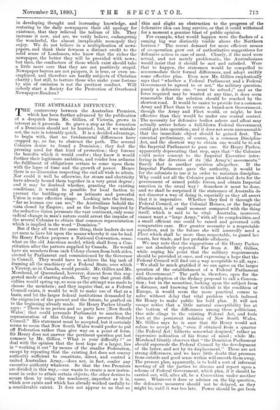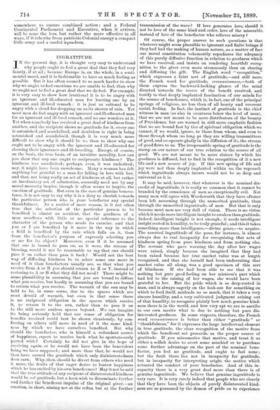THE AUSTRALIAN DIFFICULTY. T HE controversy between the Australian Premiers, which
has been further advanced by the publication of a despatch from Mr. Gillies, of Victoria, grows in interest as it proceeds. So grave a step as the formation of a Dominion should not be hurried ; but, if we mistake not, the rate is tolerably quick. It is a decided advantage, to begin with, that no fufulamental differences have cropped up, so far, to obstruct the path. The several Colonies desire to found a Dominion ; they feel the pressing need for that kind of protection ; they foresee the benefits which it would confer ; they know it would further their legitimate ambition, and render less arduous the fulfilment of obligations certain to come upon them with the lapse of time and the growth of power. Hence there is no dissension respecting the end all wish to attain. Nor could it well be otherwise, for steam and electricity have already bound them together in a very great degree ; and it may be doubted whether, granting the existing conditions, it would be possible for local faction to prevent the building-up of an intimate and powerful Union in some effective shape. Looking into the future, " far as human eye can see," the Australians behold the vista closed by Empire ; and as the feelings inspired by the seductive vision permeate the vast continent, only some radical change in man's nature could arrest the impulse of the several Colonies to obtain that common representation which is implied in the word " Dominion."
But if they all want the same thing, their leaders do not yet seem to have hit upon the means whereby it can be had. Sir Henry Parkes proposes a National Convention, some- what on the old American model, which shall form a Con- stitution after the pattern supplied by Canada. He would have six members from each Colony chosen from both sides, elected by Parliament and commissioned by the Governor in Council. They would have to achieve the big task of framing all the machinery of a Federal State, over which a Viceroy, as in Canada, would preside. Mr. Gillies and Mr. Morehead, of Queensland, however, dissent from this sug- gested mode of starting afresh. They say that great diffi- culties would spring up, so soon as the attempt was made to choose the members ; and they inquire that, as a Federal Council exists, it would be well to make use of that as a basis, and let the larger federal institutions demanded by the exigencies of the present and the future, be grafted on to the beginning already made. Sir Henry Parkes bluntly says : " There is no person and no party here [New South Wales] that could persuade Parliament to sanction the representation of this Colony in the present Federal Council." His statement must be accepted, but it certainly seems to mean that New South Wales would prefer to put off Federation rather than give way on a point of form. Sir Henry does not answer the pertinent question put last summer by Mr. Gillies, " What is your difficulty 9" or deal with the opinion that the best hope of a larger, lies in " working it out" by means of the smaller Federation, except by repeating that the existing Act does not convey authority sufficient to constitute, direct, and control a united Australian Army,—does not, in fact, confer any executive authority whatever. So that the two Premiers are divided in this way,—one wants to create a new instru- ment in order to attain certain objects; the other desires to secure them by using the machinery, imperfect as it is, which now exists and which has already worked usefully to a considerable extent. It does not appear to us that so thin and slight an obstruction to the progress of the federative idea can long survive, or that it could withstand for a moment a genuine blast of public opinion. For example, what would happen were the flashes of a. coming big war distinctly visible above the Northern horizon ? The recent demand for more efficient means of co-operation grew out of authoritative suggestions for defensive action in case of need. Clearly, if the need were We may note that the suggestions of Sir Henry Parkes are not absolutely rejected. Far from it. Mr. Gillies, while urging his point that the military requirements should be provided at once, and expressing a hope that the Federal Council will find out a way acceptable to all, says : " We shall be much gratified if we can agree on the larger question of the establishment of a Federal Parliament and Government." The path is, therefore, open for the ultimate adoption of the Sydney proposal to call a Conven- tion ; but in the meantime, looking upon the subject from a distance, and knowing how ticklish is the condition of Europe, it would seem the more practical course to solve without delay that vital problem which induced Sir Henry to make public his bold plan. It will not escape notice that a little natural susceptibility lies at the bottom of the differences among these politicians. One side clings to the existing Federal Act, and feels hurt at the persistent isolation of New South Wales. Mr. Gillies says he is sure that Sir Henry would not refuse to accept help, " even if obtained from a quarter [the Federal Act] hitherto somewhat despised," rather an expressive indication of his frame of mind ; while Mr. Morehead bluntly observes that "the Dominion Parliament should supersede the Federal Council by the development of the latter, and not by its displacement." These are not strong differences, and we have little doubt that pressure from outside and good sense within will smooth them away. The present plan, apparently, is to hold a sort of informal meeting of all the parties to discuss and report upon a scheme of Federal Government, which plan, if it should be carried out, will, after all, be a Convention under another name. Whatever it does or advises on the big question, the defensive measures should not be delayed, as they might be, until it was too late. Power should be got from somewhere to ensure combined action ; and a Federal Continental Parliament and Executive, when it arrives, will be none the less, but rather the more effective in all ways, if it inherits from patriotic Colonial energy a compact little army and a useful squadron.







































 Previous page
Previous page